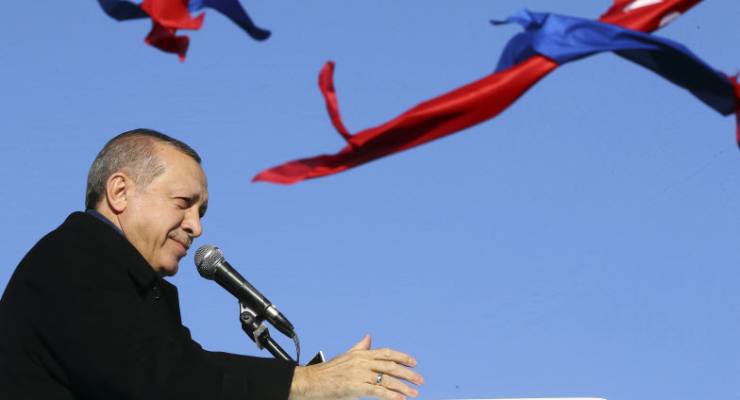
It has been a long time coming, but Turkey was never going to tolerate an independent Kurdish military on its border. In the face of of the United States helping the Syrian Kurdish People’s Protection Units (YPG) establish a 30,000-strong anti-Islamic State “border security force” in northern Syria, Turkey has massed forces along the northern Syrian border, started shelling Kurdish-Syrian territory and, according to Turkish President Recep Tayyip Erdogan, is preparing to invade.
Who are the players here?
A little under 20% of Turkey’s population is Kurdish, concentrated in its east, and Turkey has long resisted — sometimes brutally — attempts at Kurdish independence. There is also a small ethnic Turk population in northern Syria, which Turkey has armed and supported against other groups, including Islamic State and the YPG.
The bid by Iraqi Kurdistan to establish an independent state was expected to test Turkish resolve, until conventional Iraqi forces pushed Kurdish Peshmerga forces from the key city of Kirkuk last October. According to Crikey’s sources within Iraqi Kurdistan, attempts to seize other Kurdish strongholds were repulsed.
In Syria, a Turkish attack against the YPG-held city of Afrin would be an extension of Turkish operations against Islamic State forces and the YPG, which split the Kurdish controlled area and placed the region from A’zaz to Jarablus under the control of ethnic Turk fighters. Afrin is a key city held by the Democratic Federation of Northern Syria, also known as Rojava. Its “capital”, Kobane, sits hard against the southern Turkish border.
The Turkish government regards the YPG as linked to Turkey’s banned Kurdistan Workers’ Party (PKK). The PKK has been targeted by Turkish forces since a failed ceasefire in 2015.
Movements and commitments
With Iraqi Kurdistan seeking an outlet for potential oil and other energy exports, it was according to military analysts spoken to by Crikey that Rojava could link with Iraqi Kurdistan to form a corridor to the Mediterranean as well, eventually, helping create a common Kurdish state. There are about 35 million Kurds across Turkey, Syria, Iraq and north-western Iran.
An autonomous Kurdish state, along with an independent Armenia, was detailed in the 1920 Treaty of Sèvres. This treaty was supplanted by the 1923 Treaty of Lausanne, which carved the current borders from the region, which contributed to the Armenian Genocide and which created a fragmented Kurdish people.
Both the YPG and Peshmerga have been the most competent military forces in Syria and Iraq in recent years, with both leading the battles to defeat Islamic State. However, as a mountain people, the Kurds have not been politically united.
The Kurdish situation is complicated by shifting alliances. In Iraq, Peshmerga was supported by the United States, which withdrew its support following last year’s Iraqi Kurdistan’s declaration of independence in favour of its client state, Iraq. However, the US supports the Kurdish Syrian YPG.
In Syria, Russia had supported the YPG, particularly in its battles against Islamic State, but now opposes the YPG formalising its regional military status in favour of its client state, Syria. According to a Peshmerga source, Russia now provides military support to Iraqi Kurdistan.
What next?
So, the Kurds in Syria and Iraq have swapped supporters, from opposing camps, with the patrons of the patron-client relationships seeking to leverage advantage in each other’s backyards. For the Kurds, however, it is a case of battling the outsiders with whatever help is available, from whomever, however cynical its purpose or short-lived its support.
When Turkish forces, formally allied with the US through NATO but increasingly friendly with Russia, cross the Syrian border, the mountains may be the Kurds only refuge. It is for good reason, therefore, there has been a marked reprise among Kurds of their old saying: “The mountains are our only friends.”
Damien Kingsbury is Deakin University’s Professor of International Politics.








Thank you for a useful overview of a complex and fragile situation. One point – it seems difficult to credit “the 1923 Treaty of Lausanne, which carved the current borders from the region, which contributed to the Armenian Genocide” as the genocide happened 6-8 years earlier, 1915-17.
I was thinking that too. Date mix-up.
NATO ‘Turkxit’ followed by a military alliance between Russia and Turkey. With Syria in tatters, Iraq in rebuild mode and knobbled by IS and the US completely distracted by North Korea and internal squabbling (as well as lacking true leadership), Turkey has no further need for NATO. With its EU ambitions in shreds, aligning with Putin offers plenty of opportunity.
Have you noticed how Russia is moving into the vacant US space? Trump’s plan is a one state solution which means complete apartheid and Kushner’s family developing the West Bank as his old man already does. Vlad must be laughing himself to death.
The US admits to having about 2000 troops in Syria. They were dicussing surface to air missile deliveries to to the Kurds, amongst other assistance. Let’s hope we don’t get sucked into this festoring boil when it bursts. Recent history suggests we’ll sign up.
Typical cut’n’paste from this writer who, as usual, gets thing arse up because he has no grasp of the blocks of prose he shuffles, trying to follow the script from Langley VA.
The US via NATO and the deluded EU wannabe hegemon courted Turkey for decades despite/because of its military coups and now gets the vapours when Sultan Erdogan the Magnificent turns north for a new thrill.
This one will run & run. Pray that we don’t join in.